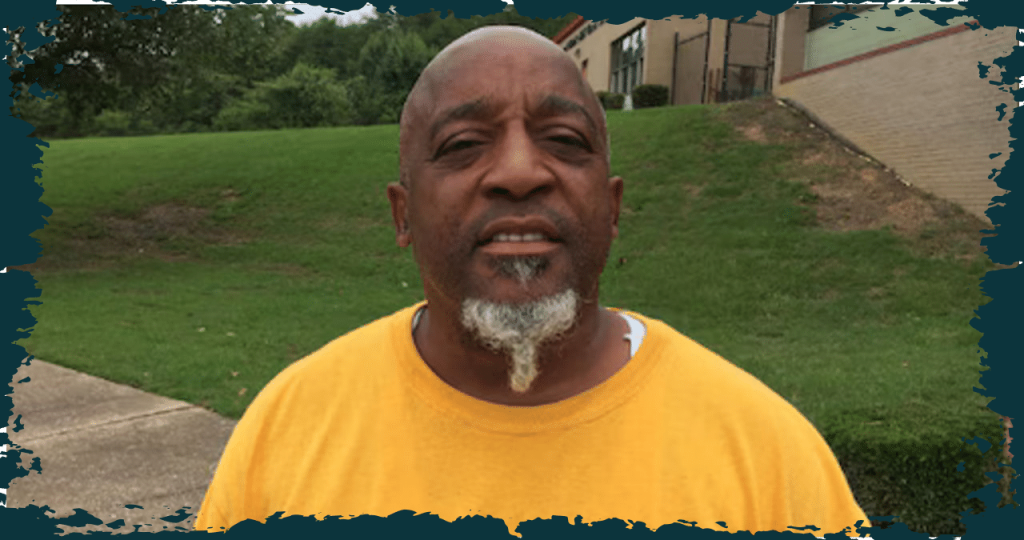For three decades, Kenneth Sharpton-Glasgow, an Alabama activist, fought relentlessly for the voting rights of individuals with felony records.
Before his 11-month stint in federal prison for tax evasion and drug distribution, he held a different perspective. However, being incarcerated alongside individuals who were involved in the U.S. Capitol riots on January 6, 2021, changed his outlook.
In a recent phone interview from his car, Sharpton-Glasgow shared his thoughts on current events, including the presidential candidacy of Donald Trump. “Now we have Trump, a presidential candidate, running for office and he’s got 34 felonies,” he remarked. “So, to me, I’m like, is that God smiling on me?” Despite his time in prison, Sharpton-Glasgow maintains a positive outlook and sees hope in unexpected places.
After his release from prison this week, Sharpton-Glasgow shared with AL.com that he recognizes a new opportunity during this election year. He hopes to make felon disenfranchisement a bipartisan issue, especially since both former President Trump, a Republican, and Hunter Biden, son of current Democratic President Joe Biden, have felony convictions on their record.
At the age of 59, Sharpton-Glasgow has primarily gone by the surname Glasgow throughout his life. Despite being the half-brother of the renowned activist, Rev. Al Sharpton, he has resided in Dothan since childhood when his mother, Tina Glasgow, brought him there.
In 1964, Rev. Al Sharpton was born to Al Sharpton, Sr. and Ada Sharpton. Their family welcomed Tina Glasgow, Ada’s teenage daughter from a previous marriage, into their home. Soon after, Kenneth Glasgow, the son of Al Sharpton, Sr., was born.
Growing up, Kenneth Sharpton-Glasgow had a complex relationship with his name. While his birth certificate carried the name Kenneth Sharpton, he went by Glasgow. His decision to use his mother’s name was prompted by the stabbing of his brother during a protest in New York City. Sharpton-Glasgow believed that using his mother’s name would help protect him from potential retaliation.
According to ProPublica, Sharpton-Glasgow developed the concept for TOPS – The Ordinary People Society during his 14 year sentence for drug offenses in Florida. During his time in prison, he studied religion and converted to Christianity. Upon his release in 2001, he returned to Dothan where he became a preacher and community activist. His efforts were primarily focused on assisting individuals who had been incarcerated and those who were involved in drug-related activities.
Working together, Sharpton-Glasgow collaborated on various campaigns aimed at restoring voting rights to felons in Alabama. Their efforts were successful, culminating in the passing of a bill in 2017 that gave the right to vote back to many people who had been convicted of drug crimes. Additionally, they were involved in initiatives in Florida to help former offenders register to vote.
Glasgow was arrested and charged with capital murder, even though he had no involvement in the shooting incident. However, the charges were dropped almost three years later. Glasgow was unaware of his passenger’s intentions to shoot someone.
Sharpton-Glasgow was found guilty of tax evasion and drug charges in 2023. According to federal prosecutors, he had utilized over $1 million donated to his non-profit organization for his personal expenses. Additionally, he failed to file a tax return while also attempting to receive disability benefits despite being physically capable of working.
In August 2023, he began his sentence in federal prison. He noticed a stark contrast from his time in a Florida state prison, as there was less violence and more resources available. Along with fellow inmates, he dedicated his time to facilitating the registration of eligible inmates to vote.
According to Sharpton-Glasgow, individuals who are incarcerated in federal prisons are allowed to vote as long as their crime is not related to moral turpitude.
Sharpton-Glasgow is continuing to address the same issues he prioritized before going to prison, but he is also seeking a new beginning following his release. As a result, he has decided to change his name.
Al Sharpton, Sr., who is 97 years old, wrote a letter to his son in prison. In the letter, he requested his son to change his name back to Sharpton as his last wish.
Al Sharpton Sr. expressed his deep sadness over the fact that the achievements of the Sharpton family were never acknowledged in a letter he shared with AL.com. “One thing that has always grieved me all these years is that no one could recognize your great accomplishments as belonging to the Sharpton family,” he wrote.
Sharpton-Glasgow felt that the letter was a positive sign, especially after going through a tumultuous seven years. However, he also expressed his desire to retain his mother’s name as she had faced numerous challenges to keep and raise him.
Sharpton-Glasgow pointed out that throughout Biblical history, individuals who were touched, redeemed, or resurrected by God were often given new names, or had their existing names altered or enhanced. In her own experience, she feels that a similar transformation is occurring.
Until the court allows him to return to Dothan, Sharpton-Glasgow will be staying at the halfway house. His plan is to concentrate on preaching and delegate the responsibility of running The Ordinary People Society. He will continue to prioritize serving those who are often overlooked by society.
Sharpton-Glasgow emphasized that prisoners are people just like everyone else, citing biblical figures such as Paul and Peter who wrote significant portions of the New Testament while in prison. “Paul in the Bible, he was in prison, and he wrote two-thirds of the New Testament,” she said. “Jesus went through prison and the crucifixion. Peter wrote a letter from prison.”
